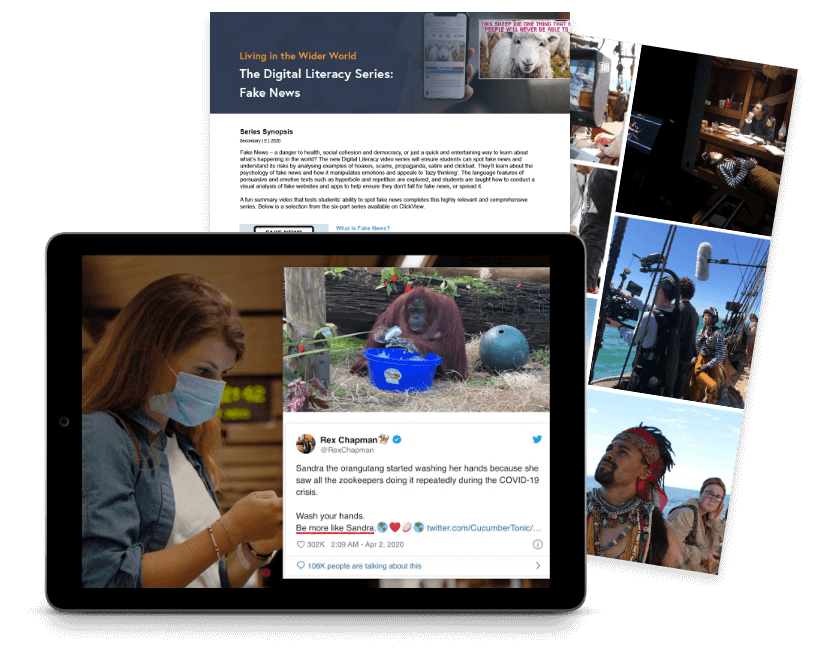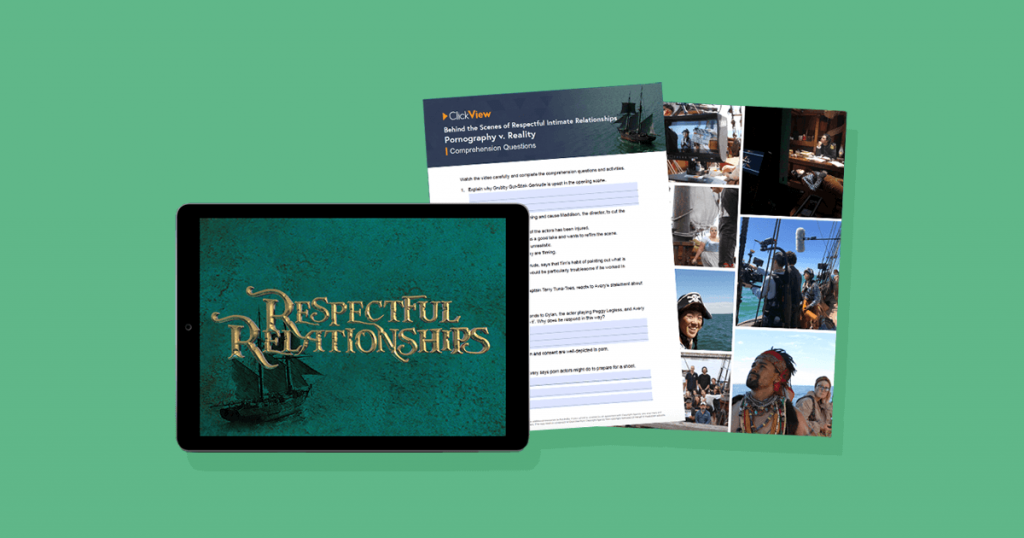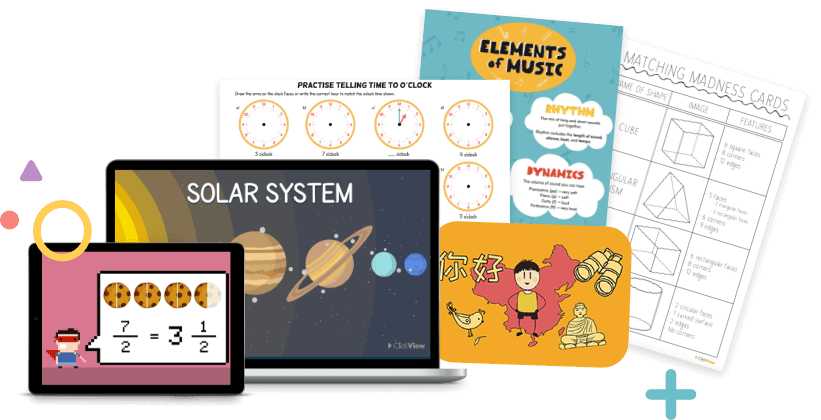ClickView: Supporting educators and schools with the transition into the new RSE curriculum
RSchools across the UK have been told to start planning to deliver the new RSE curriculum as soon as possible. From January 2021, inspectors will start reporting on schools’ readiness to teach the new curriculum and future plans to meet the Department for Education’s latest statutory guidance.
At this time, there is much for educators to consider in their planning. While for some, the delivery of the new mandatory RSE curriculum will build upon existing teaching, for others it’s the beginning of a new educational journey. With the understanding that there are challenges when it comes to teaching this kind of content, we want you to know we’re here to support you through this transition and beyond.
What are the new RSE curriculum changes?
From September 2020, sex and relationships education (SRE) is being replaced by compulsory relationships and sex education (RSE).
The following will become mandatory as part of the PSHE curriculum:
- Relationships education in all primary schools
- Relationships and sex education in all secondary schools
- Health education, including mental health, in all state funded schools.
When developing curriculum, teachers should be mindful that RSE teaching should be developmentally and age-appropriate, evidence-based and inclusive, mindful of religious backgrounds, sexual identity and gender identity.
Further non-statutory guidance has also recently been shared by the DfE. In teaching the new RSE curriculum, schools and educators have been advised to (among other things):
- Explain the harm of ‘cancel culture’ and no-platforming
- Avoid reinforcing harmful gender stereotypes
- Use inclusive language
- Ask for support
While the recent complementary advice has been controversial, schools minister, Nick Gibb, said it would “equip all schools to provide comprehensive teaching in these areas in an age-appropriate way”.
Some background to the changes
Existing guidance is now out of date. Since 2000, many changes have occurred in the world that impact the future of relationships education. These include:
- The growth of social media
- Online pornography
- Sexting
- Grooming
- Changing attitudes and laws around sexuality, gender and marriage.
These curriculum changes are both timely and necessary to equip young people with the skills they need to understand and develop respectful relationships. Writer and author, Rebecca Jennings has been working with children and young people in educational settings teaching sex and relationships education, and sexual health initiatives for 17 years. Rebecca believes a well planned and executed RSE curriculum is key to both the online and offline safety of our young people.

‘The new curriculum is so important for young people,’ Jennings explains. ‘It allows them to talk about issues and topics in a safe space within the classroom setting. Young people are exposed to so many mixed messages through the ever-changing online world. They need a safe space to make sense of it all.’
Why teach respectful relationships in schools?
Teaching about respectful relationships is essential to a well-rounded education, and an important part of social and emotional development. ‘If children have the correct information, they are more likely to make informed decisions based on the right messages,’ says Jennings.
By embedding positive behaviours and attitudes of respect and equality within a school setting, the ripple effect can see positive impacts on mental health, classroom behaviour, interpersonal relationships and academic outcomes for students. Beyond the classroom, positive relationships can promote self-esteem, enhance physical health and develop a sense of belonging in young people.

By unpacking respectful relationships, students can reflect on their current relationships and have the tools to support them as they form new ones. By learning how to recognise and communicate their emotions and feelings, students become comfortable to discuss and resolve family, friendship and relationship issues. Through exploring gender stereotypes, discrimination and more, students can develop empathy, resilience and inclusivity, setting up a solid foundation for future relationships.
The new RSE curriculum also explores respectful intimate relationships, incorporating topics such as the impact of pornography and of sending nude images. It encourages open conversation with young people about sexuality and kindness, and the need to respect one another. This new curriculum delves into topics that young people have long been exposed to, until now without crucial guidance and support from trusted educators.
Helpful support and resources for teachers
Using carefully developed RSE resources in your classroom helps both you and your students to engage in robust conversations, address their concerns, and work through sensitive and complex issues in a way that feels achievable.
At ClickView, we understand the challenges for educators when it comes to teaching RSE content. We’re here to support you with these mandated curriculum changes and help you deliver lessons on respectful relationships and sex education with confidence. All our RSE resources are developed in consultation with subject experts, so you can support your students’ physical and mental health and wellbeing in a meaningful, age-appropriate way.
A curriculum-aligned, ready reference PSHE guide
You can access our ready reference guide to help you through the transition to the new PSHE Relationships Education (RE) primary curriculum and the PSHE Relationships and Sex Education (RSE) secondary curriculum.
ClickView meets the new RSE curriculum
We’ve put together a guide to help you through the transition to the new PSHE Relationships and Sex Education (RSE) curriculum. For many, these resources will build upon the wonderful work you already do, while for others it’s the beginning of a new journey.

The guide is just a taste of the collection of dynamic teaching and learning video titles available on ClickView. Resources, such as lesson plans and various classroom activities accompany each video. The guide explicitly links to targeted curriculum content, giving you a wealth of resources on hand to support the teaching of PSHE, including:
1) Relationships & Sex Education
- The collection includes the contemporary series Teens 101, exploring depression, eating disorders and LGBT inclusivity, plus videos on bullying, digital citizenship and more.
2) Mental Wellbeing
- A broad collection of videos and resources around understanding self-esteem, stress and cultural expectations, resilience and digital citizenship and more.
3) Living in the Wider World
- This collection has a huge number of digital learning resources spanning topics from career and study inspiration to digital and financial literacy.
Getting parents, carers and families on board
Central to the new mandatory guidance is the need to consult and inform parents of RSE school policy and curriculum content. Engaging parents in conversation about RSE can help strengthen relationships between schools and families, while also promoting consistent messages about relationships, wellbeing and sexual health for young people. Parents can struggle to fulfil the role of relationships and sex educator for their own children, so may welcome external support from schools.
‘Many schools offer parents valuable training for parents on talking to their children about sensitive topics,’ says Jennings. ‘Quite often, it’s parents’ values and thoughts, or their reflection on their own RSE, that can build barriers. By involving parents…and opening up a two-way dialogue, there’s a good chance the messages from school will then cascade into the home, and important conversations can continue.’
Some ways schools can work with families:
- Asking open questions when seeking feedback on the new curriculum, for instance through forums or open meetings.
- Involving them in the development and review of schools’ RSE policies.
- Sharing curriculum and resource details publicly, such as on the school website, to ensure consistent messaging at home.
- Schools can also benefit from asking for student feedback about the RSE curriculum, with a summary shared with parents.
Many schools are already covering some or all of the new content mandated within the new RSE curriculum. For other schools, this will be new ground. With the September deadline growing ever closer, it’s clear there remains a shortage of quality content to support educators with their delivery. Within the RSE curriculum, perhaps more than in other subject areas, there are challenging and difficult concepts to deliver, such as Respectful Intimate Relationships. Great quality video and learning resources can support those both familiar and unfamiliar with delivering this content. With confidence in the teaching resources, educators can then focus on facilitating powerful learning in the classroom.
Respectful and Intimate Relationships
Two outstanding series designed for senior secondary students and their teachers explores challenging and important issues surrounding respectful relationships, including sexual harassment, domestic violence, misogyny in pornography, pornography versus reality, and the sharing of intimate images.







